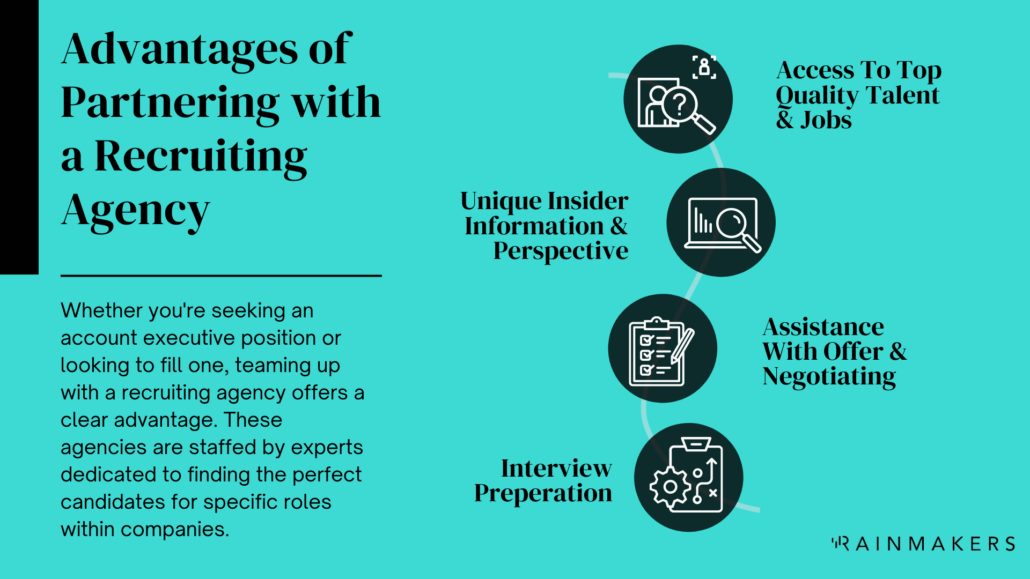Attracting the Best: How Recruiting Agencies Engage Account Executives
Finding the Right Fit
As a business leader, you know hiring the right account executive is crucial to the success of your business. However, finding the right candidates in your search can take a lot of time and resources and, if not done correctly, can be costly.
Partnering with a recruitment agency to fill this critical role will help you avoid costly and time-consuming mistakes and ensure you hire the right person for the job. Here’s how recruiting agencies find account executives.
Understanding the Difference Between Executive Search and Staffing for Junior-Level Positions
One mistake many businesses make in their account executive search is utilizing the same recruitment process they use for junior-level roles. Unfortunately, this can lead to many underqualified candidates applying for the position, slowing your recruitment process.
Seniority Level of Account Executives vs. Junior-Level Roles
One of the most significant differences in an account executive search is the position’s level of seniority. Account executive positions are often highly specialized, senior-level positions that require the person who fills the role to have a proven track record of leadership combined with the ability to execute long-term goals and business operations. As a result, finding these candidates takes a much more focused approach than finding applicants for junior-level roles.
Active vs. Passive Candidates
When searching for a junior-level role, typical recruitment efforts generally only include active candidates, those actively seeking a job. While limiting your scope to only those actively seeking a job may work well for junior-level roles, recruiting a senior-level account executive means attracting passive candidates, those currently employed at other companies who would be a perfect fit on your leadership team.
Geographical Scope of the Search
Another key difference in searching for an account executive is the geographical reach of the right candidate. While junior-level roles may be adequately filled with local candidates, searching for an account executive should go beyond your local market. The geographical scope for an account executive should be national and international to find the right person for the job.

Understanding the Needs of Your Company: How to Define Your Account Executive Hiring Requirements
The first step in hiring an account executive is defining the role’s requirements and determining the specific skill set you seek in a candidate. An account executive typically helps your business grow existing accounts, generate new accounts, eliminate competition, and use data to drive decision-making. Here are some essential skills and requirements for senior account executives:
Leadership and Management Skills
Because account executives are often in charge of a team of entry-level, junior-level, and mid-level positions, your account executive must be a highly skilled leader and manager.
Analytical Mindset
Part of the role of an account executive is to set and track measurable goals for their team and their company. Therefore, account executives need to be able to read and interpret data and generate reports on their team’s progress toward those goals.
Project Management Experience
Overseeing a project from start to finish is complex and needs someone with interpersonal skills to get the job done. Adaptability, empathy, focus, and resourcefulness are just a few. In addition, these interpersonal skills help them communicate effectively with stakeholders, management, and the various team members involved in the project.
Proven Track Record of Success
Account executives need to have a track record of reaching goals and successfully executing projects throughout their careers.

How to Stand Out as an Account Executive: The Role of Transferable Skills
You need to highlight your transferable skills to stand out as an account executive. One of the best ways to do this is by managing up: being the most effective employee you can be and creating value for your boss and your company. Managing up helps you stand out from management and set yourself up for future success as an account executive.
Two Keys to Manage Up
- Develop influential internal allies who will advocate for you.
- Develop a compelling narrative surrounding your job performance.
Here’s how you do it:
- Send your manager a narrative pipeline update. Your update should include the week’s goals vs. actual sales, best and worst-case scenarios, the upcoming week’s priorities, and potential threats to meeting your goals.
- Communicating bad news. Do it often and early. Contrary to what you might think, managers need to know when something isn’t going according to plan to decide what to do if required.
- Prioritize 1:1 requests. After the routine items are taken care of, it’s time to talk with your manager about new project ideas you have, requests for different resources, and other account strategies. Make sure you track your progress toward these goals in a shared document.
- Be proactive by anticipating and meeting your manager’s needs. This takes knowing your manager’s needs and delivering on them ahead of time.
- Think cross-functionally. You can help several other departments with their goals as an account executive. This is how senior-level account executives operate and how you should, too. Help out the marketing team, product team, sales team, and others. It will go a long way toward your career success.
- Ask for feedback. Many managers are open to giving direct feedback, so ask questions with specific information in mind that allow them to be straightforward.
- Consistency. Be consistent with your managing up steps so your manager knows they can expect it from you.

How Much Do Account Executives Make?
Several factors determine an account executive’s salary, including the geographic location of their job, the size of the company they work for, the company’s job sector, and the account executive’s experience and education. Part of an account executive’s salary may be commission-based, and they could be eligible for bonuses depending on performance and revenue generated. These positions often also include benefits such as medical and dental, paid time off, and stock and retirement options.
The top earners live in states such as California, Nevada, Massachusetts, Texas, Virginia, and Washington.
In the United States, an account executive can expect to make a base salary of $68,715 annually, with the low-end being $34,938 and $135,145 on the high end/ of that average.
The Importance of Partnering with a Recruiting Agency:
Whether you are a company looking to fill an account executive position or a job seeker looking for an account executive role, partnering with a recruiting agency gives you an advantage. Recruiting agencies are staffing experts with one goal: finding the right candidates for a company’s position.
Partnering with a recruiting agency has several advantages over traditional recruitment:
- Access to top-quality talent and jobs
- Insider information on the role and candidates
- Assistance with the offer and negotiation process
- Helping candidates and companies prepare for interviews
At Rainmakers, we go beyond resumes and LinkedIn profiles to find the best account executive candidates. As a result, you can be confident knowing we match candidates to the role, helping companies hire the best person.
Our sales recruiters can help you find talent that matches your account executive role. Contact us today to get started!










